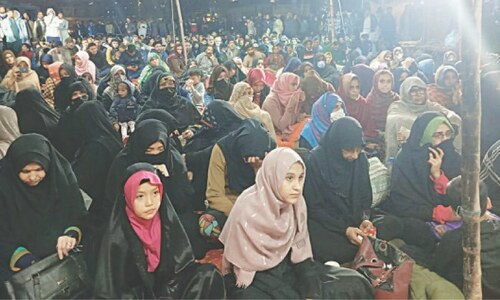KARACHI: The Sindh health department has identified that all the 21 polio cases in the city this year have been reported from 11 out of 188 union councils and planned some ‘drastic measures’ to inoculate the children properly to restore the city’s polio-free status that it had attained two years ago, it emerged on Friday.
“All the cases in Karachi have been identified within a 25km radius in just 11 union councils (six per cent of the total area), which, if an all-inclusive strategy is adopted, are not difficult to be made polio-free,” said a senior provincial government official while speaking to Dawn.
The government has been perturbed on the recent World Health Organisation’s warning that Karachi is a pivotal destination to be made polio-free to make the rest of the world safe. The global health regulator made it clear that ending polio in Karachi would end the disease not only in Pakistan but in all east Mediterranean nations. “Karachi serves as an amplifier, exporting wild poliovirus nationally and globally,” it said.
Health organisations across the world said with a population of more than 20 million, Karachi was the third largest city world-wide by population within city limits. The city’s population density is 6,000 per km-square, compared to Peshawar district of 2.5 million population with density of 1,606/km-square.
The Federally-Administered Tribal Areas has a total population of 3.2 million with a far slimmer density of 117/km square.
Officials admit that Karachi had the biggest Pashto-speaking population globally: approximately five million in 47 out of total 188 UCs where heavy population movements have been recorded.
Officials in the government as well as those in the international health organisations believe that it is feasible to end poliovirus in the metropolis. They categorise the pockets of persistently missed children in localized areas as one block considering that all the polio cases this year restricted to 11 UCs in Karachi. The officials have identified 13 highest risk areas including eight ‘super high risk UCs’ with a target population of 102,560 children aged less than five years.
The health officials said that of the 700 female polio workers, 300 belonged to the Pakhtun community. They said the 300 polio vaccination team members would work in the areas of their ethnic community, which was highly sceptical about the polio effort.
The Pakhtun female workers have been provided by the WHO. Officials in the Sindh health department said the WHO would provide 400 more such volunteers in the coming weeks.
“These female workers are being trained and will be particularly assigned to work in the super high-risk areas to inoculate children,” said Dr Khalid Shaikh, special secretary for public health while speaking to Dawn.
‘IPV to be used in eight UCs’
He said the government had also planned to launch a polio campaign in eight sensitive UCs by the end of November in which inactivated polio vaccine (IPV) would be used. The areas where the vaccine would be administered to children included three UCs in Gadap, two in Landhi and one each in SITE, Baldia and Orangi, he added.
Published in Dawn, November 1st, 2014












































